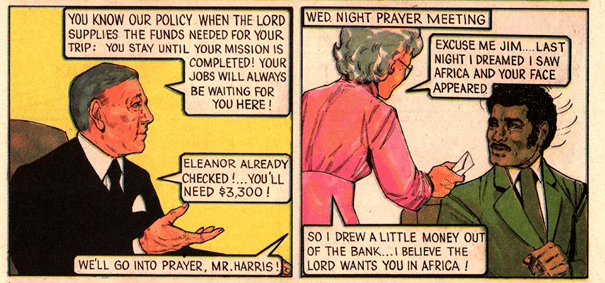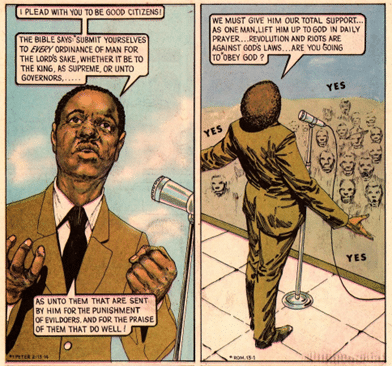There is a classic move that authors make when writing long series: they set their works in a foreign land. Usually, their protagonists see how the “other” lives and solve a problem that is generally not well thought out because the writers didn’t bother to research the countries their characters travelled to, or the countries are imaginary. So, of course, Jack Chick would do that in his comic in issues 3 and 4.
In issue 3, the protagonists go to a country in East Africa called Toganda. This imaginary country is filled with so many stereotypes that I prefer to call it Africa, since it is essentially used to represent the entire continent. The leader of Toganda is a man who suffered the horrors of British Imperialism and white people as a child, leaving him marked for life and earning him the nickname Kruma (Scarface). His hatred for the white man and pressure from the evil Chinese lead him to expel all missionaries from the country. This triggers the whole plot, as the protagonists must go there and convince him otherwise.
The evil Chinese meddling in Africa is a heritage of the cold war, and the view that the Chinese were more involved in the region. It all depended on the writer’s conspiracy level, of course, but as a writer, you can add ‘yellow peril’ to the narrative too, which is not wholly evident in Jack Chick’s work.
This panel from the comic sets the plot in action:

Aside from the obvious issue of going to a black person and telling them you dreamed of them and Africa, which is why you are giving them money to go there, we also see here what many fellow sceptics will recognise as the “God provides” argument. There’s no need to work or do anything; with prayer, the world turns upside down to ensure that wish is granted.
Now, let’s do a quick run through the rest of the plot: they travel to Toganda and meet a revolutionary against Kruma (Scarface), who the evil Chinese want to put into power. When Jim (the protagonist) meets the revolutionary, he quickly wins him over to the side of Christ. Something else happens, he has a jealous attack, but that is a side-plot. What is essential is this revolutionary’s speech at the climax, which reveals a contradictory point in Chick’s ideology:

The address pleads for the citizens to wholeheartedly support Kruma (Scarface) as president, because he is the leader. One of the Bible verses used is: “They say unto him, Caesar’s. Then saith he unto them, Render therefore unto Caesar the things which are Caesar’s; and unto God the things that are God’s.”
This showcases the hypocrisy of Jack Chick, because, if you recall, in Chick’s first comic the protagonists fought to deliver Bibles behind the Iron Curtain, disrupting the rule of the Soviet rulers. So, according to Chick, communism is terrible and should be fought… but not when it involves Kruma? What is the difference between these two situations? The answer is that the author has decided that Kruma will be saved, and therefore he is now the “right” leader for the country.
That leads us to the next comic, which is ostensibly about demonic possession in India, but really it is an excuse for Chick to accuse Hinduism of being a satanic religion filled with charlatans and criminals. The comic is dedicated to the dangers of Satan, and includes a step-by-step guide for how to perform an exorcisim, and how not to do it – exemplified by a character dying when he makes a mistake during an exorcism, causing him to become possessed by the demon he was trying to exorcise. Part of the comic is also dedicated to showing how the parents (communists, of course) tried every method to save their child, before even the doctors gave up and asked them to focus on spiritual solutions.
Exorcism is probably one of the best examples a Christian like Jack Chick has to exemplify his worldview and faith. It’s a clear representation that, yes, Satan is real, the Devil is real, and they are out to get people and destroy their life, and the only way to stop them is to follow Jesus the right away. So dedicating an entire comic to the process of exorcism, and emphasising that demonic possession and temptation by Satan can happen anywhere at any time, is very affirming to Jack Chick.
So, this is Jack Chick’s travels to the third world: a deep hatred of communism, Hinduism and a pathological fear of Satan. Comic four discusses the devil more than Jesus; the religion becomes more and more about Satan than about the supposed main character. It needs to be reinforced Satan is the leading player for Jack Chick, God is just a reactive force to the events. He has to be, else God himself must be a monster, because he allows a terrible being like Satan to exist for no reason other than to test his creations.



